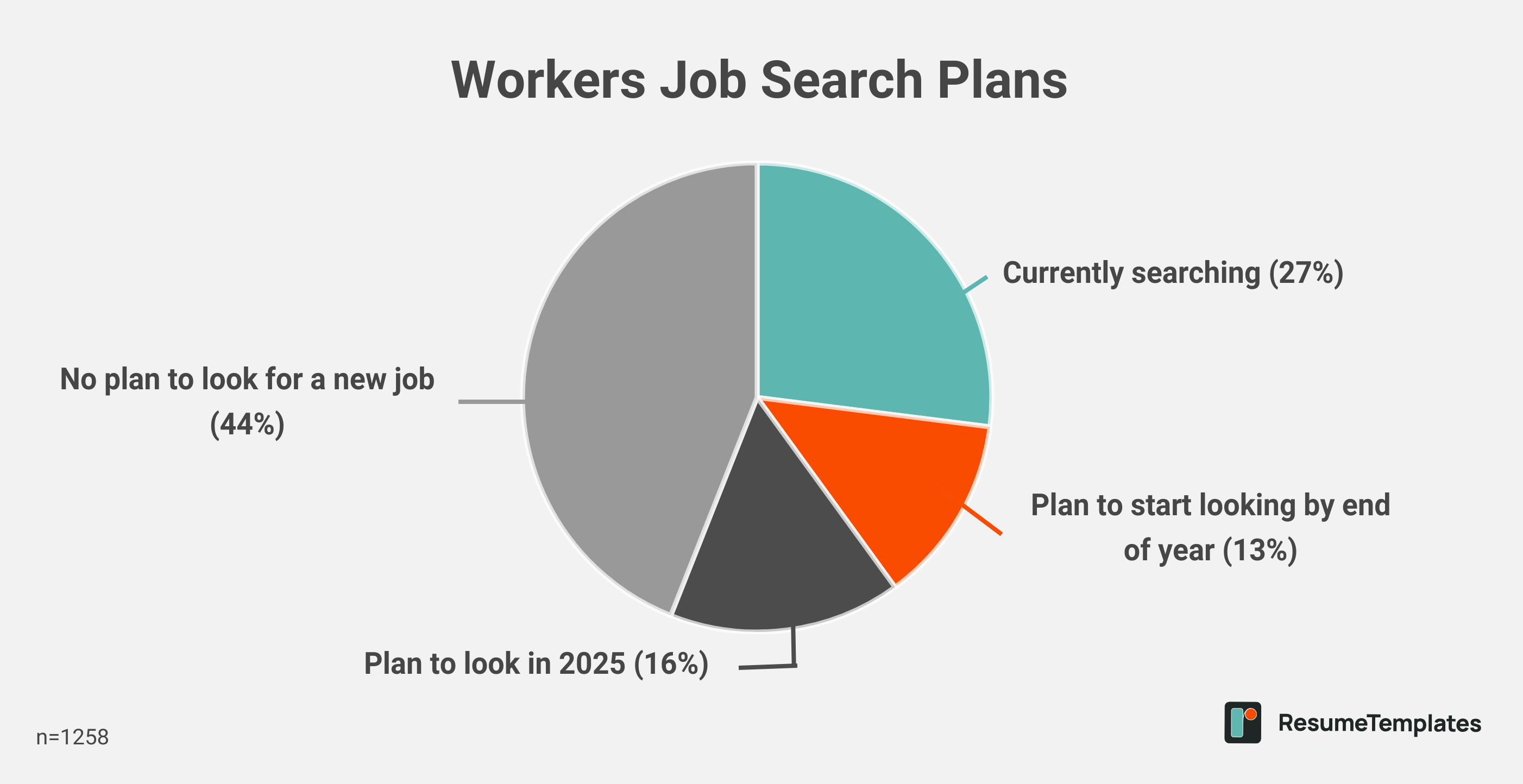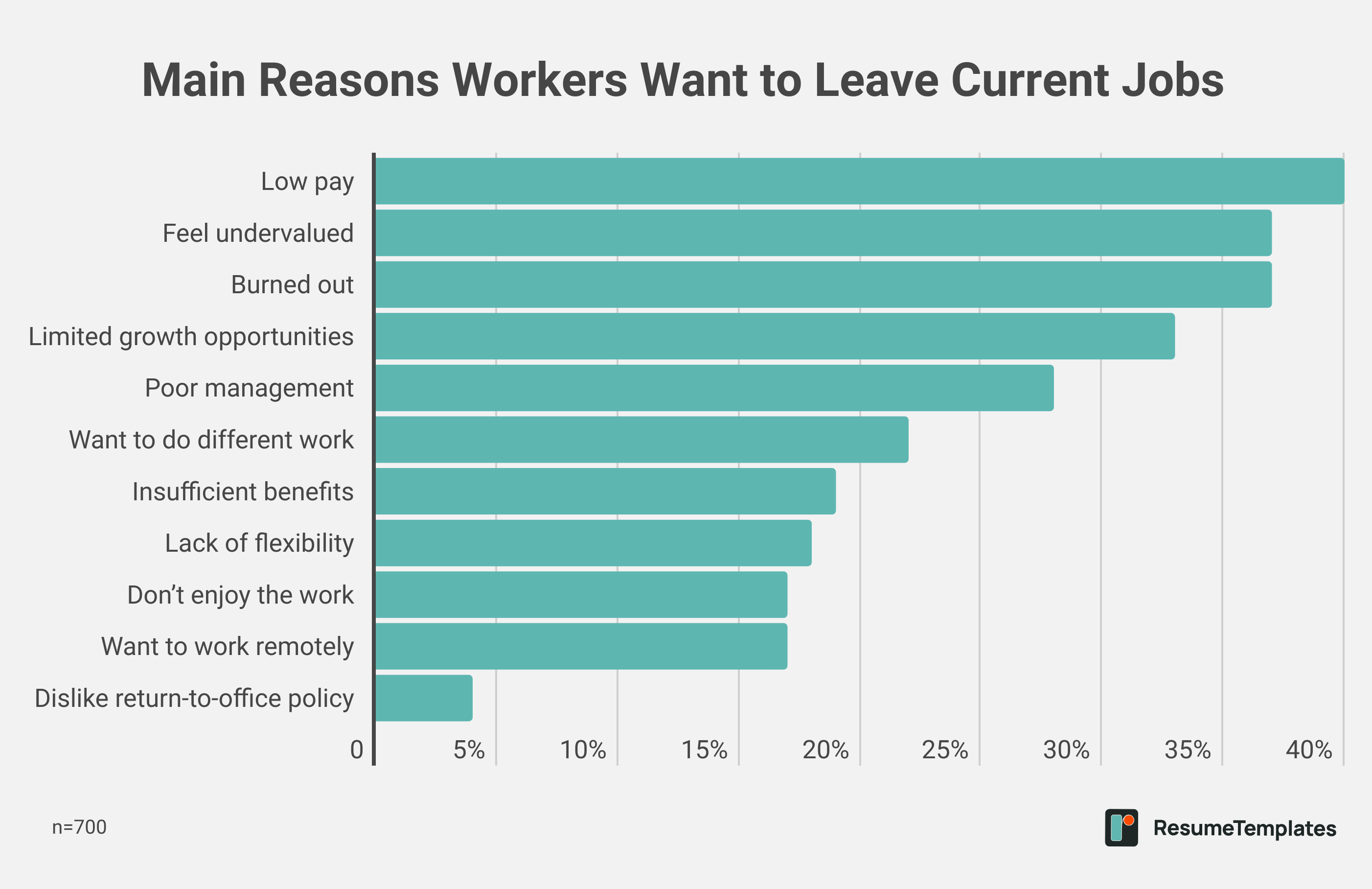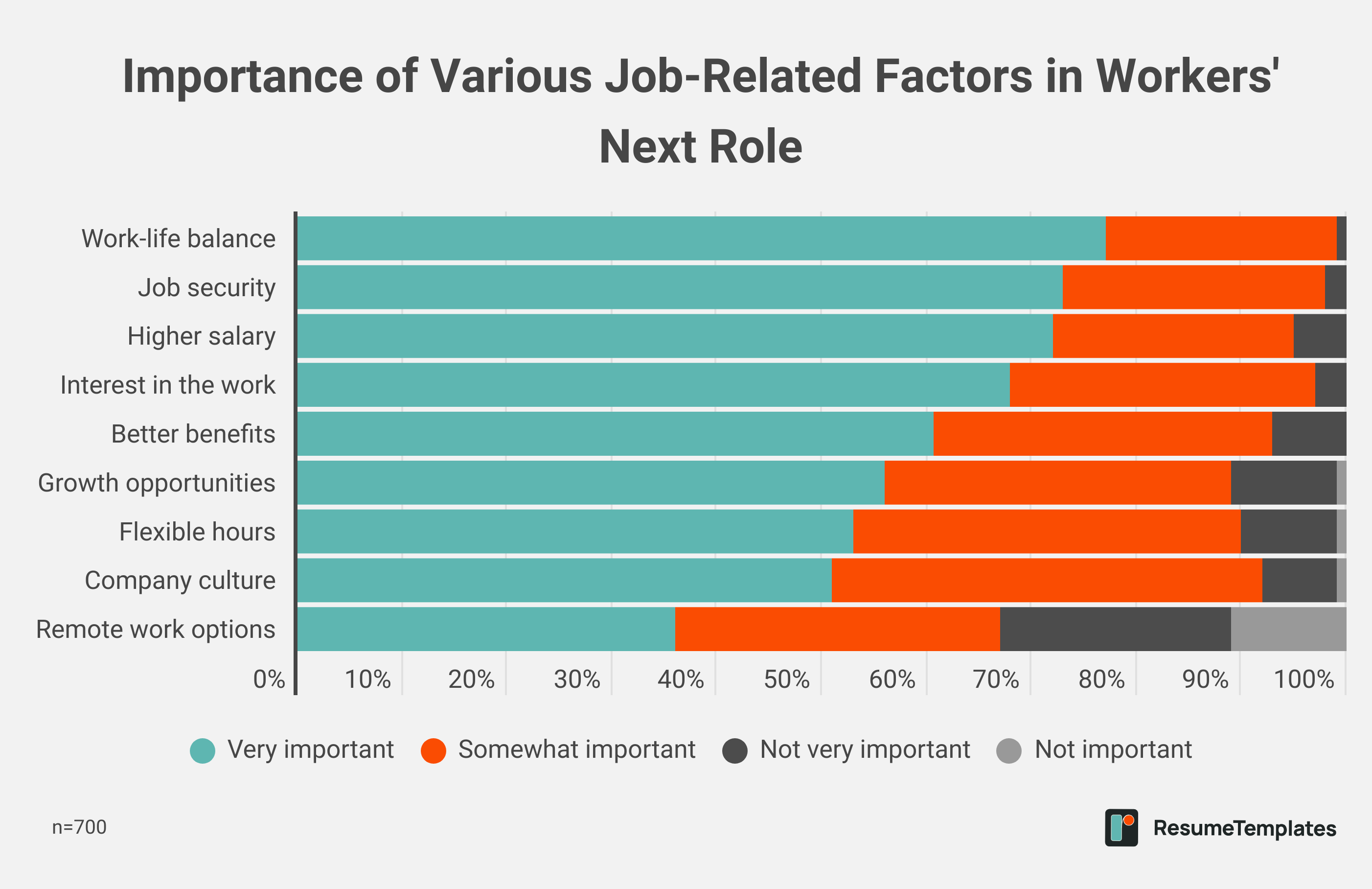ResumeTemplates.com surveyed 1,258 full-time U.S. workers in October to learn about their career plans for 2025. The survey results show that many workers are planning for significant changes in the coming year, with a notable portion already engaged in or planning to start a job search.
Study highlights:
- 56% of workers are already looking for a new job or plan to start in 2025
- 1 in 3 job seekers will quit even if they don’t have another job lined up
- Work-life balance, compensation, and job security are top priorities for job seekers
- 8 in 10 are confident they will find a new role
- Workers are concerned about how AI and the presidential election will affect their job prospects
56% of Workers Will Look for New Jobs in 2025
The survey found that over half of workers — 56% — are planning to look for a new job in 2025. Among them, 27% are already actively searching, 13% plan to begin before the end of the year, and 16% will start their job search in 2025. Meanwhile, 44% of workers have no plans to pursue new opportunities.

Confidence in finding a better job remains high. Overall, eight in 10 workers feel confident in their ability to secure a new position, with 32% feeling very confident and 50% somewhat confident. In contrast, 16% are not very confident, and only 2% have no confidence at all in finding a better role.
1 in 5 plan to change fields
When it comes to switching industries, 21% of workers plan to change fields, 31% are undecided, and 49% intend to stay in their current industries. Employees in retail, government, service/hospitality, and manufacturing are the most likely to be considering an industry switch. Many workers expressed interest in moving into health care, finance, tech, and service/hospitality roles.
1 in 3 likely to quit without another job lined up
When asked about the likelihood of quitting their job by the end of 2025, even without another job lined up, responses were mixed. A total of 16% of workers say they are very likely to quit under those circumstances, while 19% indicated they are somewhat likely. Meanwhile, 27% remain unsure about whether they would take that step. On the other side, 21% of workers say they are not very likely to quit without securing another job, and 17% say they are not likely at all.
“Unless they have the financial ability to go months without a paycheck or are in a workplace abuse situation, I wouldn’t advise someone to quit their job without having another lined up,” says ResumeTemplates’ Chief Career Strategist Julia Toothacre. “I recommend having a job search plan and a realistic timeline in place before quitting. Your role, industry, and professional network will influence how long the job search process takes.”
Low Pay and Feeling Unappreciated Push Workers To Seek New Jobs
When it comes to the reasons driving workers to consider leaving their current jobs, low pay tops the list, with 40% of respondents citing it as a major factor. Close behind, 37% feel undervalued in their roles, and an equal percentage report feeling burned out. Limited career growth opportunities are a concern for 33% of workers, while 28% point to poor management as a reason for wanting to move on. Additionally, 19% are dissatisfied with their benefits, and 18% feel the lack of flexibility is pushing them to explore other options.
Other reasons for seeking new employment include wanting to do different work (22%), not enjoying their current work (17%), and seeking the ability to work remotely (17%). Return–to–office policies are a factor for a smaller percentage (4%).

“With inflation and minimal cost-of-living increases or raises, I’m not surprised many people feel undercompensated. Companies tend to prioritize profits over employee well-being,” says Toothacre.
“Underappreciation, however, is often traced back to manager relationships. If your manager supports you, you likely won’t feel underappreciated, even if you are undercompensated. A good manager is transparent and open with their team about the realities of the organization.”
Work-Life Balance Is a Top Priority for Job Seekers
Work-life balance is the most important factor for job seekers, with 99% of respondents indicating it’s a key priority in their next role. Job security is a close second, with 98% considering it crucial, followed by interest in the work itself (97%).
A higher salary also ranks high, with 95% of respondents highlighting it as a major factor, alongside better benefits (93%) and company culture (92%). Flexible work hours (90%) and opportunities for career growth (89%) are also significant considerations. The option for remote work also remains relevant, with 67% of workers citing it as a priority.

“Work-life balance is becoming a top priority for employees as fewer people are living to work like they used to. Job security is no longer guaranteed in most roles and industries, leading many to prioritize their personal life and family over their careers. Younger generations have witnessed their parents struggle with layoffs, while older generations need to keep working but no longer want it to be their primary focus. COVID-19 has also made people more aware of what truly matters, and work-life balance will remain a key factor for the foreseeable future,” says Toothacre.
“Employers need to recognize that employees are no longer willing to sacrifice unless there’s a clear benefit. Bonuses, flexibility, and clear expectations should be key considerations when recruiting talent at all levels. While recruitment processes have become highly prescriptive in an effort to appear fair, it’s essential to listen to what candidates want and accommodate when possible. Not everything needs to be overly regulated. If you want top talent, you must negotiate based on their needs, not just what your policy dictates.”
Some Job Seekers Have Concerns About How AI and the Presidential Election Will Impact Their Search
Many job seekers are concerned about how AI and the upcoming presidential election may influence their job search.
A total of 30% of workers believe that employers’ use of AI in the hiring process will negatively impact their ability to land a job. Of this group, 9% are certain AI will harm their job search, while 21% think it probably will. On the other hand, 45% of workers plan to leverage AI as a tool in their own job search — 81% plan to use it for resume creation, 63% for writing cover letters, and 60% to prepare for interviews.
In addition to AI concerns, job seekers are concerned about the upcoming presidential election. A total of 35% believe the election will impact their job prospects. Among them, 57% think their opportunities will improve if Donald Trump is elected, while 43% feel that a Kamala Harris presidency would boost their chances.
Methodology: This survey was launched October 16, 2024. In total, we surveyed 1,258 U.S. full-time workers. This survey was census-balanced for U.S. regions.
Media inquiries can be directed to [email protected].
Resume Templates offers free, HR approved resume templates to help you create a professional resume in minutes. Choose from several template options and even pre-populate a resume from your profile.